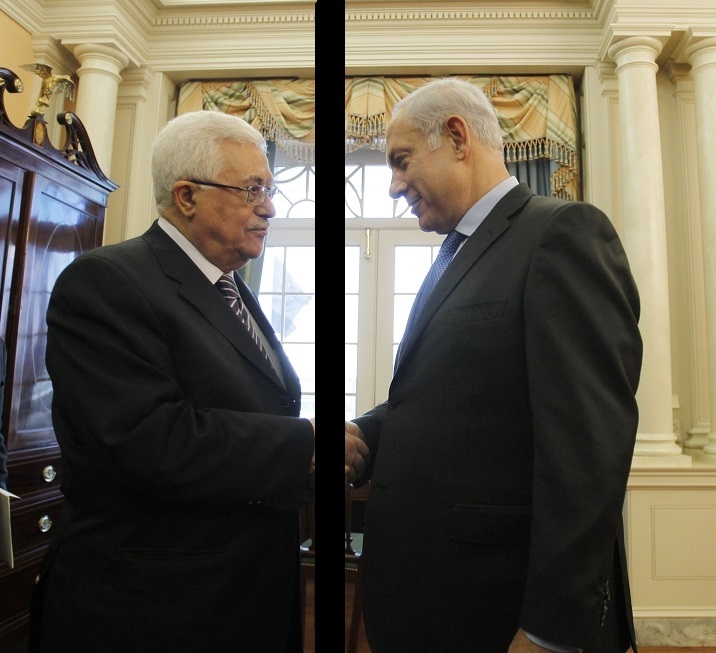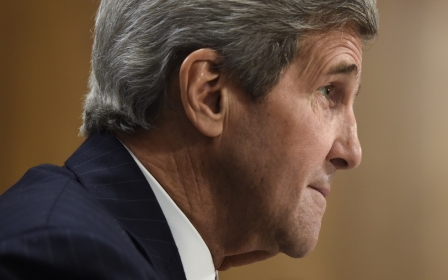Israeli-Palestinian ties hit new lows as criticism mounts on all sides

The floundering Israel-Palestinian talks edged towards brinkmanship on Wednesday as Israeli Prime Minister Benjamin Netanyahu ordered most government ministries to cut communication with the Palestinian Authority (PA).
All ministries, other than Defence and chief negotiator Tzipi Livni's office, Netanyahu said, are to cut comunication with their opposite numbers in the Palestinian Authority, following Palestinian Authority President Mahmoud Abbas' decision to apply for membership of 15 United Nations organisations.
Reports emerged late Wednesday that, as part of the severence of ties, the Israelis planned to block tax revenue collected by Israel on the PA's behalf, given that meetings between the finance ministers dealt principally with this issue.
An Israeli official confirmed that the government "envisaged withholding part of the amounts remitted... each month in reaction to the unilateral Palestinian moves."
The official added that the "important sums" given to Palestinian prisoners held by Israel and to their families each month by the PA is a "form of supporting terrorism."
"We envisage holding back the equivalent of that" unspecified amount, the source said.
Israel briefly withheld tax revenues in December 2012 to punish the Palestinians for their successful drive for observer state status at the United Nations.
Also on Wednesday, in an emergency Arab League meeting held to hear a request by Abbas for greater financial support amid Israeli and US threats of sanctions, the League blamed Israel for the current impasse in the talks and reiterated their refusal to recognise Israel as a Jewish state.
'Poof' astounds Israelis
The further derailment of talks follows a political tail spin which began on Tuesday when US Secretary of State John Kerry testified before the Senate Foreign Affairs Commitee and seemed to blame the Israelis for the faltering talks.
"Both sides wound out in a position of unhelpful moves," Kerry told the committee. “The treaties were unhelpful and we made that crystal clear to the Palestinians. The prisoners were not released by Israel on the day they were supposed to be released and then another day passed and another day and then 700 units were approved in Jerusalem and then poof, that was sort of the moment. We find ourselves where we are."
The State Department sought to cushion Kerry's comments on Wednesday with spokeswoman Jen Psaki stressing that Kerry was blaming both sides. Still, his testimony - which set Twitter alight on Wednesday with frequent references to his "poof" comments - was said to have "deeply disappointed" Israelis, according to an official in Prime Minister Benjamin Netanyahu's office quoted in The New York Times.
Kerry, the officials said, “knows that it was the Palestinians who said ‘no’ to continued direct talks with Israel in November; who said ‘no’ to his proposed framework for final status talks; who said ‘no’ to even discussing recognition of Israel as the nation-state of the Jewish people; who said ‘no’ to a meeting with Kerry himself; and who said ‘no’ to an extension of the talks.”
The Secretary of State's comments were also lambasted by the Israeli Economy Minister, Naftali Bennet. "Israel will never apologise for building in Jerusalem. I hear that the programme in Jerusalem was defined as 'poof'. For many years they tried with explosions and bombs to stop us being in the eternal capital of the Jewish people. It will not happen."
Israeli ministries cut ties
Israeli Cabinet Secretary Avichai Mendelblit informed ministers of Netenyahu's decision to cut ties between Israeli and Palestinian ministries over the course of Wednesday morning, emphasising that only low-level communications were to be permitted.
Knesset Finance Committee chairman Nissan Slomiansky said that Netanyahu made the right choice, arguing that Israel should not be held hostage. “It's a serious mistake to think that we need to pay a price just so people will talk to us. I commend the prime minister for his decision to respond with determination to the Palestinian Authority's provocations.”
But doubts over the actual ramifications of the move were quickly raised. Palestinian minister of labour Ahmad Majdalani, speaking to AFP, dismissed the significance of Israel's tactic. "In any case there are no meetings organised between Palestinian and Israeli ministers, apart from the finance ministers. Ninety percent of day-to-day dealings are done with the Israeli military administration.”
Criticism at home
As the peace process, originally expected to conclude by an April 29 deadline, reached perhaps its lowest point on Wednesday, both Netanyahu and Kerry faced mounting pressure from domestic forces. Abbas also came under fire from Hamas, which called on him to terminate talks and "unleash the resistance."
Labor Chairman and opposition leader Isaac Herzog slammed the government over its decision, accusing it of adding fuel to the fire. "The prime minister is handing petrol and flammable materials to the last of Israel's haters," Herzog told Haaretz.
"It's not clear what good will come of this superfluous move of cutting off relations with the Palestinian Authority," he added. "In fact, it's quite clear what damage will come of this step. It will harm the interests of the state of Israel and its economic sector."
Zbigniew Brzezinski, a former US national security adviser, along with several other former US officials, called for Kerry to push Israel harder, including curbing the building of settlements.
"Halting the diplomatic process on a date certain until Israel complies with international law and previous agreements would help to stop this activity and clearly place the onus for the interruption where it belongs," they wrote in Washington-based newspaper Politico.
However, Israel continues to have strong support from many Republicans and hard line Democrats in Congress who are unlikely to allow Kerry too much room.
Despite mounting tensions, observers say it is likely that the talks will continue, if only for political necessity.
"Without [Kerry] and his peace process," said Aaron David Miller, a longtime Middle East peace negotiator. "Bibi fears isolation and what will happen with respect to boycotts and pressure on Israel. And Abbas is smart enough to know that, no matter how popular it may be on the streets of Palestine, taking his statehood campaign to the international arena won't get him an independent country."
Middle East Eye propose une couverture et une analyse indépendantes et incomparables du Moyen-Orient, de l’Afrique du Nord et d’autres régions du monde. Pour en savoir plus sur la reprise de ce contenu et les frais qui s’appliquent, veuillez remplir ce formulaire [en anglais]. Pour en savoir plus sur MEE, cliquez ici [en anglais].


